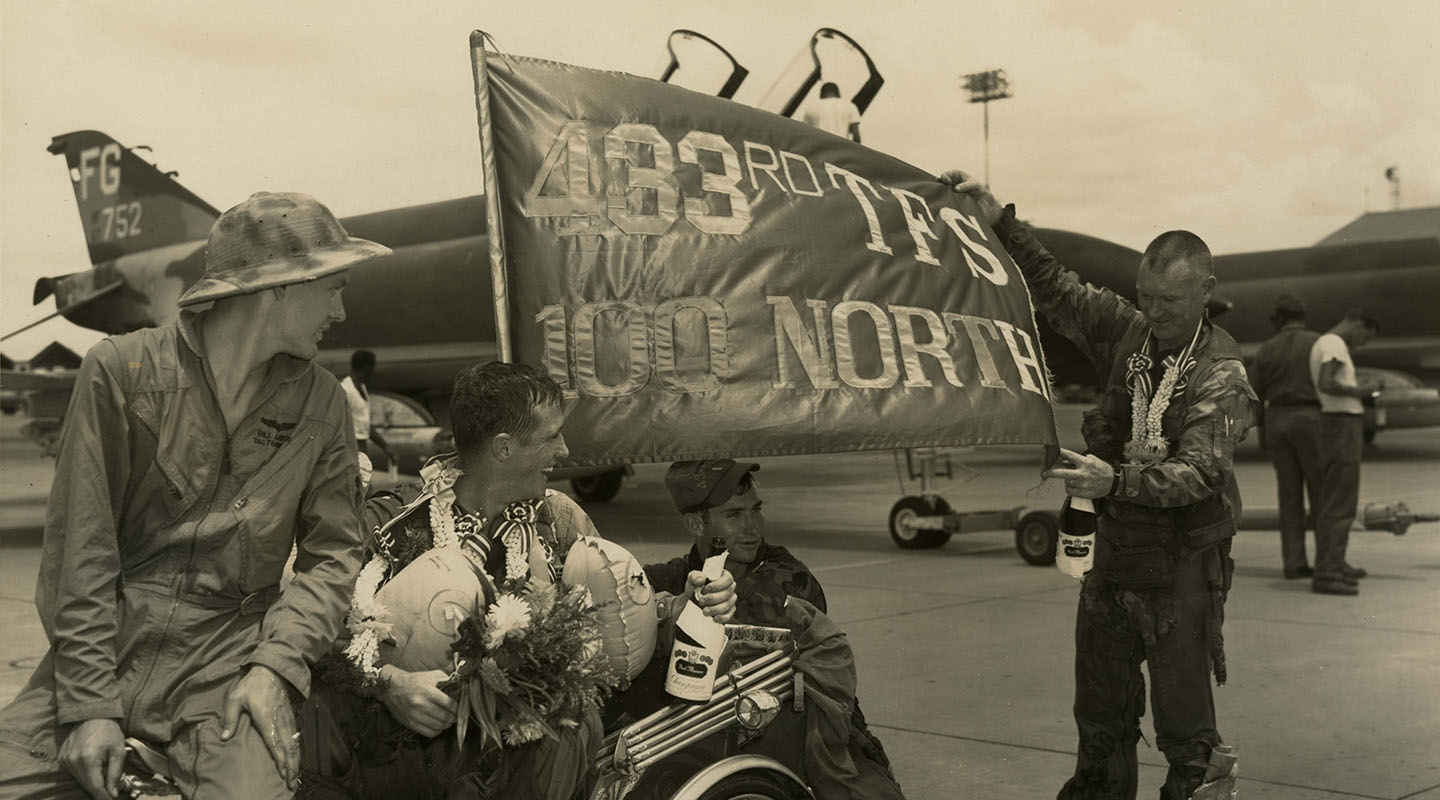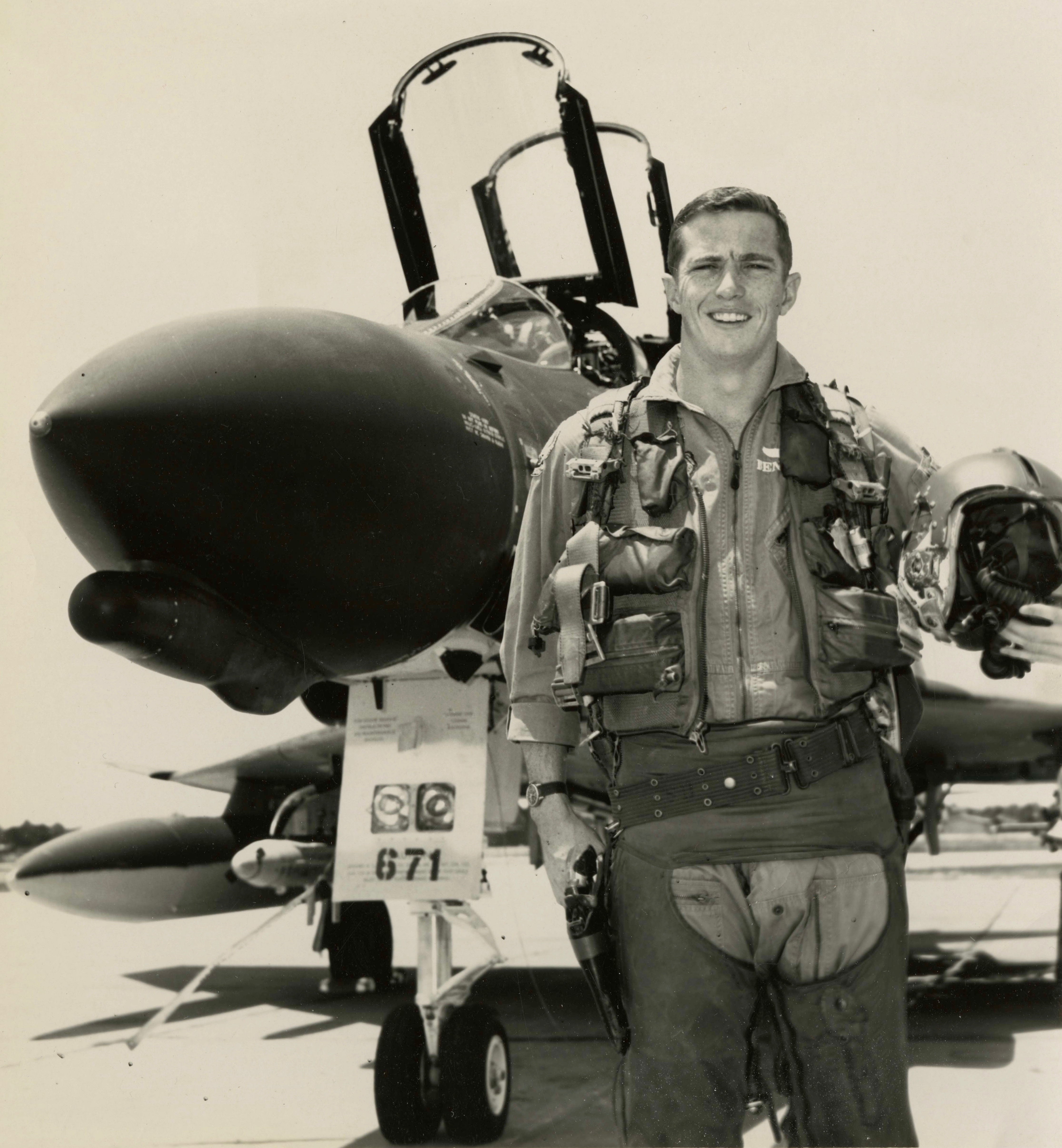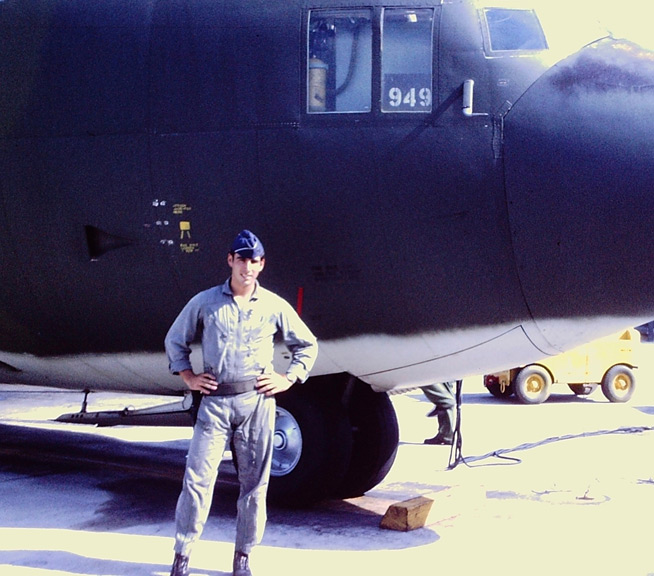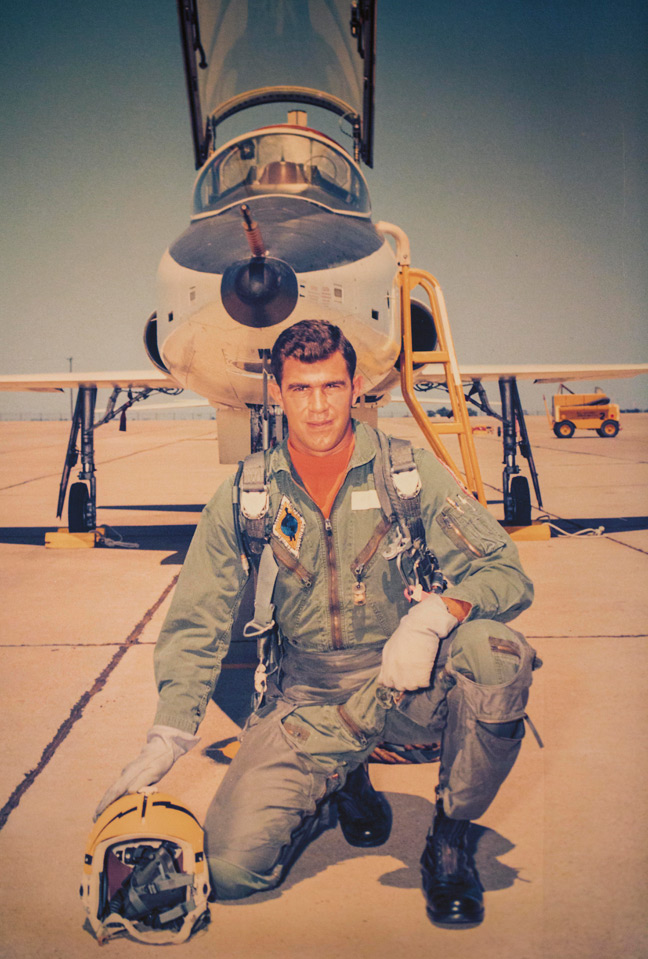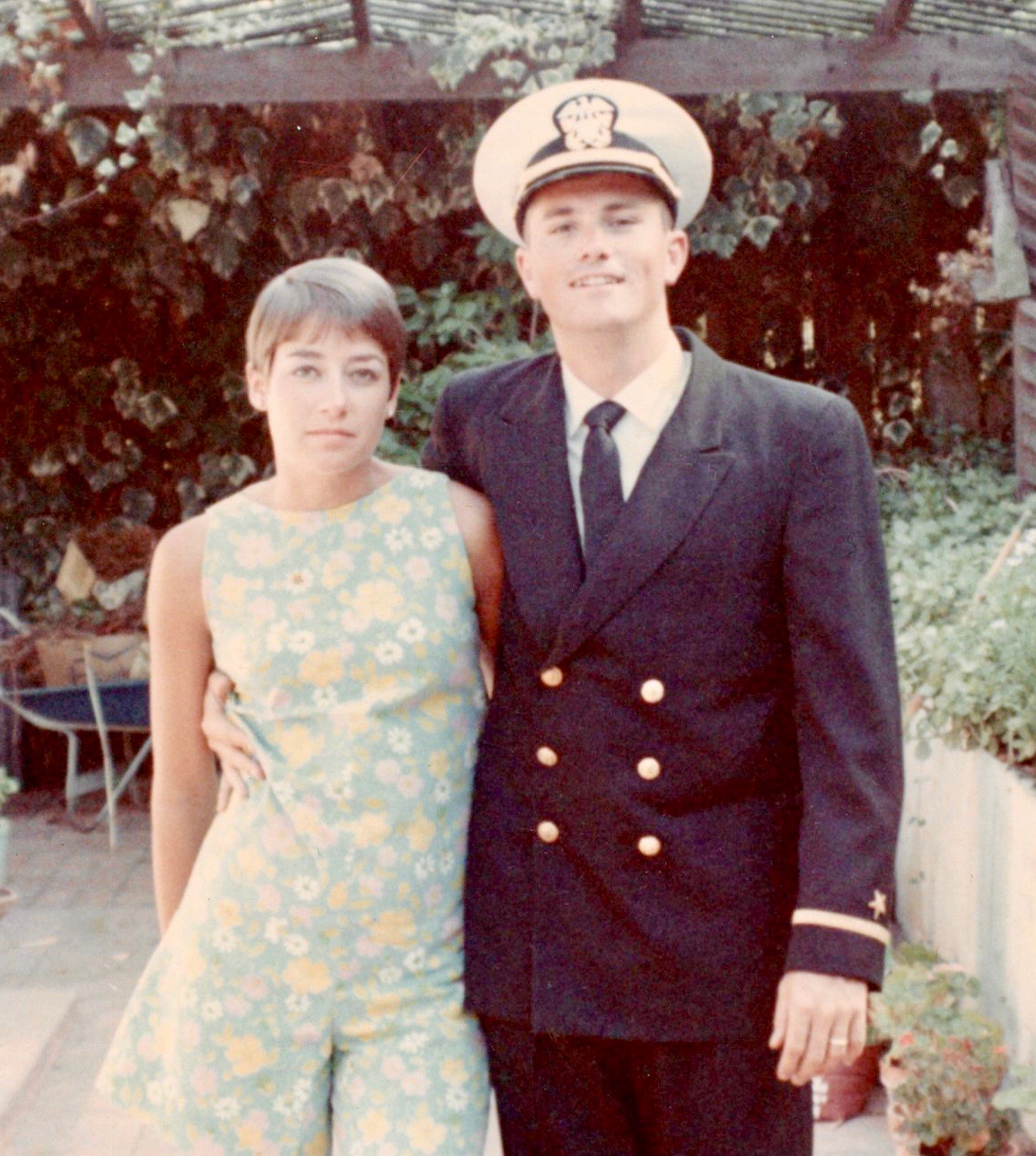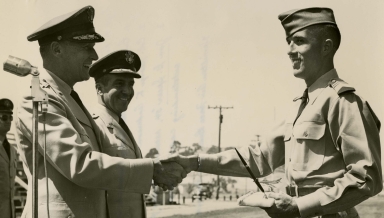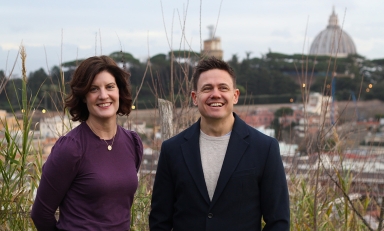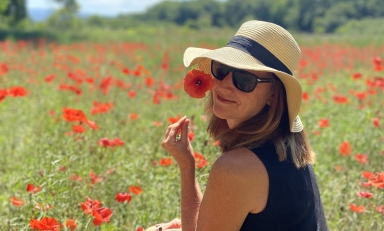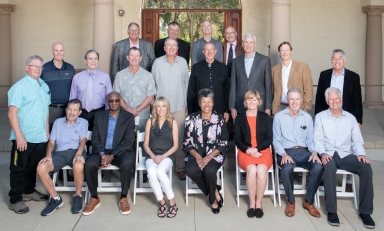Half a century after their time in Vietnam, a dozen alumni share their war stories—the camaraderie, the challenges, and how their Oxy education readied them for combat
By Doug Beacham ’64
When I completed Air Force ROTC as a senior at Occidental in 1964, the U.S. military presence in the Second Indochina War was minimal. Of nearly 2.7 million active-duty personnel, fewer than 24,000 Americans had been dispatched to Vietnam. After attending Officer Training School, I was assigned to undergraduate navigator training at James Connelly Air Force Base in Waco, Texas, in January 1965. Ten months later, I reported to Lockbourne Air Force Base in Columbus, Ohio. For the next 18 months, I flew across North America and throughout Europe, South America, and Central America in a C-130 Hercules, a four-engine turboprop military transport aircraft. We hauled anything anywhere the military needed it.
By the end of 1967, more than 485,000 U.S. soldiers were in Vietnam. I was up for overseas assignment that year, with the choices being 18 months to two years without dependents in the Philippines, or three years at Naha Air Base, Okinawa, with my family. My wife, Sue Swarts Beacham ’66, was pregnant with our son, so we chose the longer tour.
Our crew also flew for six months above the Ho Chi Minh Trail in Laos. We were unarmed forward air controllers flying at night, looking for enemy road traffic. When we found them, we dropped flares to expose their position, and summoned fighter/bombers for the attack. On one nighttime strike we worked with Col. Rick Bennett ’63, who flew 398 combat missions in Southeast Asia, 135 of them over North Vietnam.
On another memorable mission, one that could have been my last, we spotted 105 enemy trucks (I know for sure because I counted them twice) backed up at the mouth of the Mu Ghia Pass in northern Laos. My aircraft commander pleaded for two hours for attack aircraft, but none came.
Finally I took matters into my own hands, and out of sheer frustration, fired six angry rounds from the .38 caliber pistol I kept in my survival vest. Mind you, I was in a moving C-130 flying at 9,000 feet and the enemy trucks were far below. It seemed like a good idea at the time!
By the time support arrived, the trucks had scattered. We missed what would have been the biggest single interdiction air strike of the entire war.
The year 1968 was filled with adventures like that, but my crew and I did have a lot of fun along the way. There’s a bond created in combat unlike anything else because it’s a life-and-death environment. Being in a war zone is scary. Combat is downright terrifying.
My situation was not unique. Many of my Oxy friends have similar stories to tell, and several of them told me that their service in Southeast Asia is the most meaningful thing they have done. The experience helped them focus their lives when they returned.
We fought in an unpopular war, one that grew even more so over time. Many men our age tried to avoid military service by staying in school and keeping a deferment, getting married and having kids, faking physical illness, or going to Canada. Those of us who served, for whatever reason—patriotism, adventure, to avoid being drafted into the Army—are in the minority. When we returned home, we were met with open hostility or were simply ignored.
It has been a half-century since we served in Vietnam. Many of us found it hard to tell our stories, so for a long time we didn’t. Everyone I contacted for this story is a decorated veteran; most are reluctant to list their medals and other honors. We want you to know who we are, what we did, and what we learned—not only at Oxy, but in service to our country.
Rick Bennett ’63 made the military a career, retiring in 1991 after almost 30 years in the Air Force. He eventually became commander of the first Air Force F-15 squadron, and had his “last rodeo” in Operation Desert Storm.
Rick flew two combat tours in F-4s during the Vietnam War: providing close air support from 1966 to 1968 in South Vietnam’s Cam Ranh Bay, and Ubon Royal Thai Air Force Base, Thailand, operating against interdiction targets along the Ho Chi Minh Trail, and bombing strikes against a variety of administration-approved targets in North Vietnam and the Hanoi area.“There was stress, of course, and sadness with the loss of fellow airmen to enemy fire from MiGs, surface-to-air missiles, anti-aircraft artillery, and operational accidents,” Rick recalls. “But those days were also exciting, challenging, occasionally hair-raising. We had great spirit with the flying squadrons and support crew—unforgettable experiences. I’m happy and proud I was there, in the airborne action. Wouldn’t trade it.”
Looking back on his service, Rick says Oxy impacted him in several ways. “Most obviously was Air Force ROTC under Col. Robert Ladd [who taught at Occidental from 1960 to 1965 and directed much of the U.S. air base construction in Vietnam and Thailand early in the war]. He was the second most influential mentor in my life, behind my father. And, after having been exposed to many different styles of leadership, inspiration, motivation, and problem-solving and goal seeking at Oxy, I think my liberal arts education helped me roll with the punches not only during my Vietnam time, but through my subsequent years in the Air Force.”
Ron Hankins ’64 was one of several Oxy Air Force ROTC cadets who served in Vietnam; he went on active duty in January 1965. After flight school, he was assigned to an HU-16 Albatross, an amphibious flying boat used for air and sea rescue. But when he volunteered for Vietnam in the summer of 1966, the Air Force switched him to a single-engine utility aircraft, the Helio U-10 Courier.
At about 1 a.m. on Dec. 4, 1966—less than 48 hours after his arrival at Tan Son Nhut Air Base near Saigon—the base was rocked by several mortar attacks, “one of which blew one of our Army defenders through the door of the building we were holed up in,” Ron recalls. Although no one was seriously injured, “We still did not have weapons and were right on the flight line where the Viet Cong were blowing up aircraft and buildings,” he adds. “This was not a positive beginning.”
Ron was assigned to a psychological warfare air unit that dropped leaflets and played propaganda tapes through an amplifier mounted on the plane. The mission was relatively simple, he says, although the enemy did offer cash rewards for the capture of various military personnel: $5,000 for Agent Orange spray plane crew members and $1,200 for psychological warfare pilots.
Ron enjoyed a varied career following his release from service in February 1970, including making beer cans and electronic substrates for Coors, selling timber to mining companies, working as a miner, and owning a machine and welding shop. He farmed for 23 years before moving to Florida and opening another machine shop, retiring in 2016.
Mike Garoutte ’65 enrolled in the Air Force ROTC at his mother’s suggestion. (“Why don’t you just try it for two years?” she said. “You can always drop out later.”) He ultimately went through flight training at Vance Air Force Base in Oklahoma, and after graduation chose to fly the C-123 Provider cargo plane. “Two months at Hurlburt Field, Fla., one week of Jungle Survival School in the Philippines, and I was then in-country.”
Mike served in Vietnam from March 1967 to March 1968, stationed at Da Nang and flying into Khe Sanh and Hue during the heaviest fighting of the Tet Offensive. “Whatever you had to get from here to there, we carried it: passengers, mail, ammo, livestock, gasoline, medevac, USO entertainers—you name it.” Mike once carried the entire South Vietnamese army payroll (“6 million piasters”).
Asked about his first impression of Vietnam, “I was scared shitless,” Mike admits. He was convinced there was a Viet Cong around every corner, “and he would shoot me immediately” because he was white. Luckily, he ran into a high school friend in base security at Tan Son Nhut who showed him around and convinced him much of the country was relatively safe—you just had to be careful.
After his discharge in August 1972, Mike applied to every airline under the sun, but there were too many pilots looking for jobs at the time. He became a life insurance agent and had a successful career for 35 years.
Dave Hickson ’66 enlisted in the Air Force in October 1966. After OTS and flying school, he was stationed at Clark Air Force Base in the Philippines. A fellow “trash hauler,” Dave logged more than 2,000 flight hours in Vietnam over a two-year period, flying C-130s and carrying “just about everything imaginable,” even dropping bombs on occasion.
Dave was a co-pilot the first year, and an aircraft commander the second. He landed at big airfields and small dirt runways from Cambodia to the Demilitarized Zone—but when pressed for specifics, he demurs. “Let’s just say it was a very maturing experience,” says Dave, who completed his service in May 1971, went on to law school, and practices law in Encinitas today.
Steve Ryf ’67 joined the Air Force for pilot training in 1967 “to avoid being drafted into the Army.” He flew the C-130 mostly in Europe for the next two years before getting orders to fly the AC-130A gunship Spectre based at Ubon RTAFB in Thailand.
As a gunship pilot, his job was to fly night missions from Ubon over the Ho Chi Minh Trail in Laos. Their mission was to interrupt truck traffic coming out of North Vietnam through Laos into South Vietnam.The experience of flying over the trail was like “nothing I could have imagined,” Steve recalls. His crew flew at night and spent three hours patrolling and looking for trucks. They used infrared and low light sensors to pick up traffic and were armed with 20mm Gatling guns and two 40mm cannons to engage them. The enemy fired 37mm and 57mm anti-aircraft artillery back at them.
On one occasion his gunship received 2,000 rounds of artillery fire, and in one month Steve had four SAM (surface-to-air) missiles shot at him. One of the four SAM shots required a violent evasive maneuver that cracked both wing spars from the g-force. Steve admits he was pretty scared at first, but it became business as usual—focusing on the flying and not the tracers.
“There’s obviously a stark contrast between the protected environment at Oxy and flying combat missions, where I had to survive heavy enemy anti-aircraft fire each time out,” Steve adds. He flew in friendlier skies for Delta Airlines for 30 years after his discharge in January 1973. “I did feel a kinship with other college-educated pilots who were looking forward to life after Vietnam. I feel that athletics at Oxy helped me work as part of a team to accomplish a goal.”
Dave Rhode ’65 was the first in his family to serve in the military, entering the Navy’s Aviation Officer Candidate School in November 1966. “Ten weeks later I was an officer and a gentleman,” he says. “Thirteen months after that I was training in combat aircraft.”
In October 1969, Dave found himself at “Yankee Station” in the Gulf of Tonkin off the coast of Vietnam on the aircraft carrier USS Ranger. He flew an A-6 Intruder off the carrier into Vietnam and Laos to impede the flow of enemy supplies from North Vietnam. He was deployed for eight months, flying both day and night missions in all types of weather. His squadron lost five aircraft, and five squadron mates were killed in action out of 20 or 21 pilots, including his roommate.
After his discharge in June 1971, Dave went into the retail appliance business, taking over his father’s company in Fullerton, which he ran for 40 years until his retirement.
Even though there were occasional moments of apprehension and fear, “The entire Navy/Vietnam experience was a wonderful time in my life,” Dave says. “I was doing something very few have experienced.”
Steve Matson ’64 took a different course to Vietnam. He served with the Peace Corps for two years in Thailand prior to joining the Army. He was stationed at Fort Sill, Okla., when he got his orders to go to Vietnam.
Steve worked in battalion headquarters for the First Air Cavalry, where he was responsible for making recommendations to the battalion commander for assignment of personnel to units in the field. He spent a year in Vietnam from July 1968 to June 1969, stationed first at An Khê, and then Biên Hòa.
After two years in the Army, Steve (who later became an attorney) was discharged in June 1969. He says he did not support the war because he believed that the premise for it—the doctrine of Communist containment, which dates back to the late 1940s—“was not valid, and I knew President Johnson was not being honest with the American public about what we were doing in Vietnam. He said there were not bombing bases in Thailand, and I knew that to be false—I was in Thailand at the time. He said that our troops were not in Cambodia, which I also knew was false—I was in Vietnam at the time. Nevertheless I chose to serve because I loved my country and did not want to live anywhere else.”
Chris Calkins ’67 was in his first year of law school in March 1968 when Gen. William Westmoreland called for more troops, and his draft board indicated they were going to pull his student deferment. He ended up in Navy Officer Candidate School, where he roomed with Tim Brown ’67. That July, he was shipped out to an oiler, the USS Manatee.
“I spent 21½ months on the Manatee, ending up as operations officer and navigator, with approximately 20 months shuttling from Subic Bay to the coast refueling from An Thoi near the Cambodian border to the Gulf of Haiphong,” Chris recalls. “We only touched land twice—once at Vung Tau and once at Da Nang. When things got hot off Korea, we were shifted there for a few weeks, operating out of Sasebo, Japan.”“In many ways it was surreal. On ship it was just routine, if intense, but we would get crews rotated on board who had been in the rivers or close support. Some left, and later we heard of their deaths on the rivers.”
“The experience on the ship at sea, long transits, and working all of the tools necessary was extraordinary,” says Chris, who finished law school after his Navy service and became a partner in a large law firm and later CEO of a private company in Carlsbad. (He also has served as a trustee of Oxy since 2006.) “I learned to work and live together with those with whom I didn’t necessary agree over an extended period of time.”
After talking to all the military recruiters who visited the Oxy campus, John Engvall ’66 selected the Marine Corps and entered Officer Candidate School in January 1967. The following August he completed Basic Infantry School. By October 1967 he was in Vietnam as a second lieutenant, assigned to a battalion engaged in combat near the DMZ. As a rifle platoon commander, he was in charge of 40 to 50 Marines, including machine gunners, mortar men, and a Navy medic.
During his first meeting with his commanding officer, it was made clear to him that an important job was to get as many of his Marines home alive as possible. In January 1968, his battalion was ordered to assist in the defense of Khe Sanh, a combat base surrounded by the enemy and under constant attack. That April, he was wounded and upon recovery was assigned as executive officer of an infantry company.
At 23, John was in charge of the lives of young men in combat—a daunting responsibility—but his training and support served him well throughout his post-war career. After his discharge in March 1972, he completed his MBA at the University of Washington and enjoyed a long career with the Weyerhaeuser Co. in Tacoma, Wash., retiring in 2006 as director of labor relations.
“My military experience—highlighted by the time spent in Vietnam—was a defining period in my life,” John says. “The friendships I made in the Marines continue to this day.”
Bob Thome ’66 served for 27 years in the Army, retiring with the rank of colonel. After commissioning at Fort Benning and airborne training, he went to Fort Bragg for Special Forces Qualification training and was assigned to the 7th Special Forces Group. He went to Vietnamese language school en route to Vietnam, where he spent two one-year tours between September 1968 and September 1971. “My experience was very positive, as much as a combat zone and combat can be,” Bob says. “I was fortunate to work with highly trained professionals in both Special Forces and Rangers during both tours.”
“We were in Vietnam for the right reasons, but with exceptionally poor political and military leadership (political generals) on both the American and Vietnamese side. The vast majority who fought and died in Vietnam did so with honor and dignity. For me personally, my Lord and Savior Jesus Christ gave me my moral center and protection to do what was right. The performance of my soldiers—American, Cambodian, Chinese [the Nung], Montagnards, and Vietnamese—attest to the righteousness of our mission in Vietnam.”
After graduating from Oxy, Steve Bernstein ’66 joined the Marine Corps and completed Officer Candidate School. Shortly thereafter he was sent to Vietnam as an infantry platoon commander. His first reaction upon arrival? “Wow, this is real!”
He was in combat for seven months, all in the northern part of South Vietnam near the Demilitarized Zone. He blew up bunkers along the Ho Chi Minh Trail, patrolled the DMZ, acted as security for convoys, and cleared mines from roads.
His first combat action came during the Tet Offensive in January 1968. He was ordered to take a village thought to be lightly defended, but he and his men were met instead by a company of North Vietnam army regulars. Steve was twice wounded, once by a bullet and again by shrapnel. After being hospitalized, he was sent back to the same village, but this time he knew what to expect.
Steve said he grew up quickly in Vietnam. “As a platoon commander, you have 30 to 40 young men under you, and it required making tough decisions and being able to improvise.” Steve was eventually evacuated to Guam with malaria in July 1968. After being released from the hospital, he spent the remainder of his time on Okinawa.
He credits football coach Jim Mora ’57 with having a lasting impact on him: “He was tough and disciplined—characteristics which helped me immensely in Officer Candidate School and during the tough times in Vietnam.” Steve went on to coach football and enjoyed a 40-year career at several colleges.
I was diagnosed with post-traumatic stress disorder in 1986. Back then I couldn’t have shared my combat experiences; I didn’t remember them. I disappeared into corporate America for many years, and the memories were buried. The process of recovery has not always been pretty, but I have had a lot of help from the Veterans Administration.
I do remember my encounters, fleeting as they were, with my fellow Oxy soldiers. Four of us met by chance at the Cam Ranh Bay Officers Club in 1967: Steve Bernstein, Rick Bennett, Ron Hankins, and me. (I seem to be the only one who recalls the meeting; I believe I was sober at the time.) Steve Matson and I got together at An Khê in 1968, and I ran into Mike Garoutte on the tarmac at Da Nang that same year.
We all served our country in a difficult time. We did the best job we could and are proud of our service. Steve Bernstein could be speaking for all of us when he recalls 1968 as an awful year in the States, but horrific for those in combat. “I have never been anywhere where the men were as close, particularly in the field,” he adds. “We were one.”
After returning from Southeast Asia in April 1969, Doug Beacham ’64 spent six months surfing then found a job in the financial planning industry. At age 43, he made a career change and became a general contractor. He wrote “Chairman of the Board” in the Summer 2017 issue.

